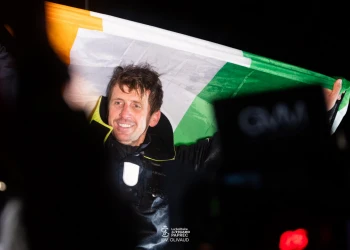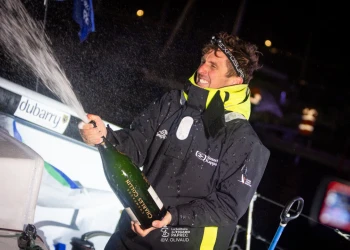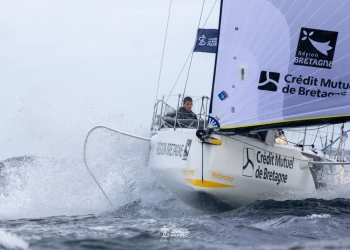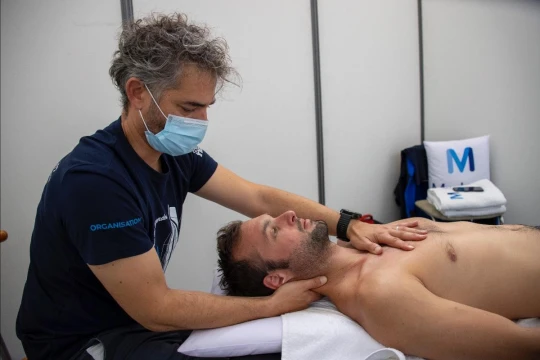
Kinesitherapist session for Alan Roberts - Seacat Services / Copyright : Alexis Courcoux
The Critical Science of Rest and Recovery, As Essential As Sailing Fast
The 34 solo racers who are taking on the 52nd La Solitaire du Figaro now have more than 1,800 miles, or over ten and half days of intense solo racing on the clock since leaving Saint-Nazaire on Sunday 22nd September. And after an especially tough 640 miles Stage 3 which finished into Roscoff yesterday, for most their batteries are all but flat.
At this stage in recent years the imminent need was to raise the depleted levels enough tough out a final 24 hours 'sprint' stage of some 120-150 miles, weather dependent. But this edition sees a return to proper hard-core roots and the final 685 miles stage starting Sunday 1100hrs goes round the Fastnet and completes the circle back to Saint Nazaire. And so, rest and recovery are top of the agenda for the skippers in Roscoff.
"They will set off again on Sunday for the last stage, pretty much in a degraded mode, at 70% of what their capacity was at the start." Explains Aymeric Rabadeux who is one of a trio of physiotherapists-osteopaths who are provided by the organization. The recovery routine for tired bodies and minds is based round massages, long full nights of sleep and periodic naps during the day, maximum hydration and healthy food.
The physiotherapy room is a welcome meeting place for the Figarists. They arrive with eyes still sleepy, hair tousled from a very long night under the duvet, or indeed in the afternoon from another essential nap. They come by a scooter to be rebuilt, to have their muscles unknotted and their minds decompressed, while taking the chance to debrief the race with their mates.
"I love coming to the physios. I come to debrief, I come to let go of everything. And it is nice to see the other sailors. In truth we don't see each other very much on La Solitaire," suggests Tanguy Le Turquais interrupting his chat with Violette Dorange. The young female sailor is listening attentively to the advice of the skipper of Queguiner-Innoveo, whose fifth participation this is in the annual solo multi stage classic.
"You need to drink a lot of water. And ideally, I recommend a little gentle jog of about 7 km just to free your legs and clear your head." Continues Le Turquais, who is taking part in his last race in a Figaro Bénéteau 3.
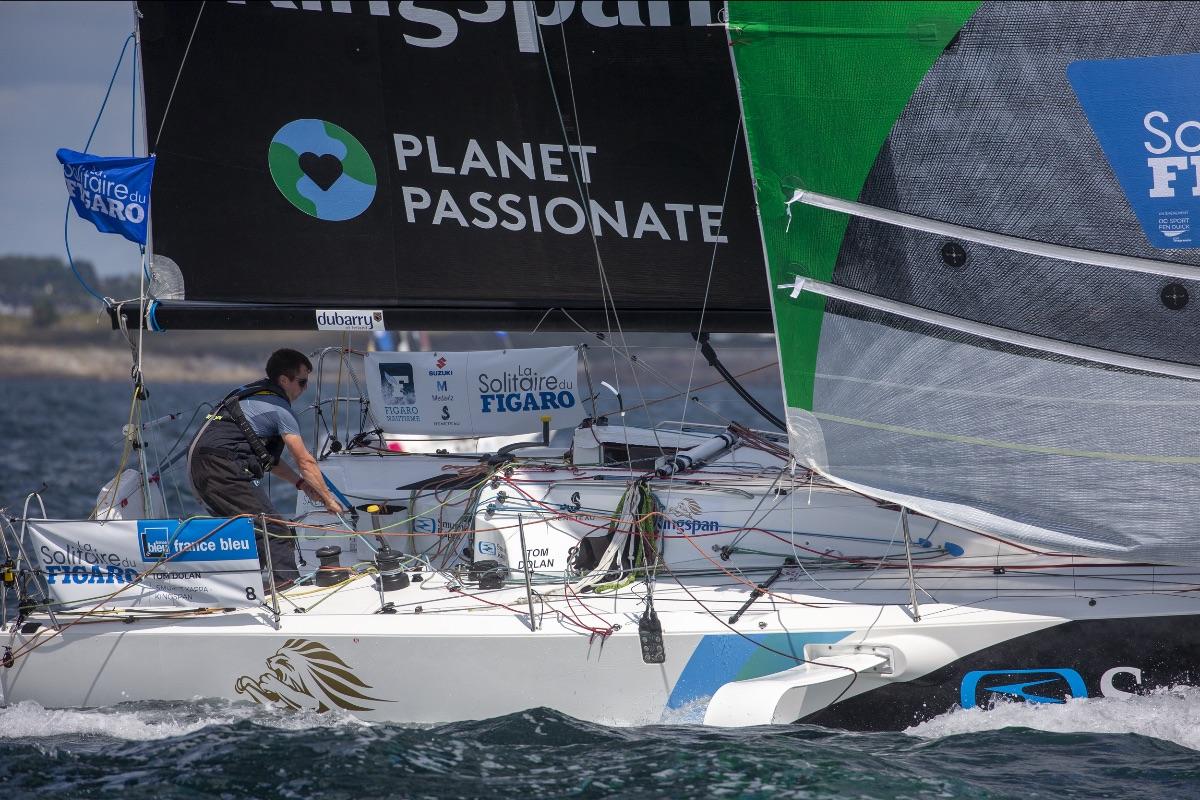
Pierre Le Boucher comes out of his session: "It's so good. It is essential to recover. I'll have to be more careful. I only drank four litres of water over the 4 days and 4 nights of racing."
It is a war of human attrition as much as anything, a test of mental and physical stamina.
"In short if we did not have physiotherapy, we would just not finish the stages "adds Benoît Mariette. Damien Cloarec agrees "This one is a real crazy Solitaire with three big stages of over 600 miles, each time that is tough! These sessions with the physiotherapist are essential."
"If it wasn't for the physios we would be in bits, they do a great job. But also I do think those of us who did the Transat are maybe in better shape because of having sailed all these miles then the muscles seem to build and adapt but we need constant physio work all the time." Explains Tom Dolan the Irish skipper.
And the science and discipline
Seacat Services' Alan Roberts puts great store in his physical preparation and, now, his recovery.
"Looking after the body is so important and the physios do a great job here, their work is invaluable. You have to stretch a lot. The body is so tense all the time. You can try to be relaxed but the reality is the boat moves a lot and the boat is really sensitive. You lock yourself in so that you always have a feel for the boat. But you then site for four or five hours and move and realise then everything is stiff because you have been in tension all that time. Then with the stacking and moving weight around, forwards and back."
"The truth is..." Roberts confesses, "I feel better than ever at this stage of a Solitaire but I really worked hard with a programme which changed the aims and objectives, and starting from 'do I want to be the fittest in the fleet, do I want to be strongest? And the conclusion was 'no, the objective is to get all the way through the season with no injuries and the body feeling good. And so, my programme has been high intensity, low weights, working all of the body just so that it looks after all of itself. The problem is that when you go to the gym and push weights then you are damaging. So this is about getting through the season."
"On the water I am very disciplined and look after myself, lots of fruit, lots of water and three square meals, sometimes four a day and snacking on all the right things. Not a lot of sugar. I stay low on caffeine maybe one or two when I feel it. And then when I am ashore lots of calories, carb loading, I have a nutrition programme, and that is even down to what I do when I reach the pontoon. I have a recovery shake with everything in it. "
"Then soon as I can I am into sleep, as much as I can as soon as I can. Last night I had 16 hours in bed, 11 hours sleep. I monitor it all. I have this (an electronic ring on his finger) which monitors all my activity. You can see what you are doing, what you have achieved in hard numbers. I like numbers and data. The aim is at least nine hours every night and at least one hour in the day. I think it is important to stay in the polyphasic (sleeping more than two phases a day). I work through the monophasic to the biphasic to polyphasic and that means you can get the body used to switching off to sleep."
Neck, shoulder and lumbar muscles damaged
The bodies spend hours under stress. In particular at the helm and trimming, the repeated sail changes, the violent jolts.
"The neck, back and knees are very stressed. Their position at the helm is unnatural, they are off-center. You can feel that all the muscles are super knotted and dehydrated, like they have cramps and aches all over the place. »Explains Rabadeux a physiotherapist-osteopath who has made a speciality of ocean racing.
So there are just two days to get as much sleep as possible and heal the bruised bodies and their lack of sleep and healthy food.
And Aymeric Rabadeux concludes: "There is a big disparity between those who train all year round, who pursue an excellent healthy life and amateurs who do not necessarily have the budget or the time to do so. A professional will leave here with 70% full batteries, an amateur maybe closer to 50%. "
Start of Stage 4 is postponed to 1600hrs local on Sunday
Because of the very light wind forecast for the planned start time on Sunday at 1100hrs and the ebb tide currents (1.5 to 2 knots) race direction have the start to 1600hrs "Rather than making the competitors wait on the water, the start is postponed to 1600hrs to try and have good conditions to give a clean start and complete a coastal course. This does not change the timing of arrival in Loire-Atlantique next Thursday. The skippers will be able to take advantage of a few more hours to rest. »Explains Francis Le Goff, race director of La Solitaire du Figaro.





